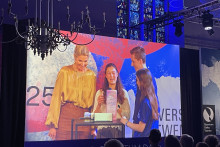From now on, the UT will use four different screening levels, project leader Sandra Konter and HR director Hans Oeloff jointly explain. The job profiles within the UT have been 'valued' for the vulnerability of certain positions. The Central Certificate of Good Conduct (COVOG) has drawn up screening profiles on which this classification is based. Konter: 'These focus, for example, on information, money and business transactions: what function does that person perform and what sensitive information does the employee have access to? Will he or she soon be working with contracts or will there be a high budget responsibility? The higher this responsibility, the higher the screening level.'
Diplomas and employers
'As a result of these adjustments, functions may shift to a higher degree of screening from next week,' says Oeloff. He explains that the UT wants to prevent risks - including espionage on sensitive information - in this way. 'For example, at the highest level of screening, we pay attention to the country of origin and check the diplomas of the university where the person studied. But previous employers and work are also discussed.'
Based on this, and after contacting the national Knowledge Security Desk, the UT refused someone from Iran in the past. The Iranian would work with technology that was sanctioned according to the Iran regulation. Earlier, the UT came up with new guidelines for travel abroad to prevent digital espionage.
The implementation
Universities are therefore regularly confronted with new measures from the government. 'The current situation and developments in the world have not accelerated our policy process. We have been working on this for some time,' says Oeloff. The HR director further explains that the aim is to carry out a screening of new employees in two to six days. This depends on whether the candidate is coming from within or outside the EU.
Oeloff and Konter indicate that the number of screenings at the UT will double as a result of this expansion. 'We will soon be checking all positions, such as: guest employees, hiring, student assistants and on-call workers,' says Konter. Although there will be extra actions for HR staff, she says it will not lead to extra workload in the department. A large part of the screening is carried out by an external party.
screening law of Bruins
At the national level, a Knowledge Security Screening Act is being prepared, which is expected to enter into force in 2027/2028. Education Minister Eppo Bruins wants to have thousands of scientists and students screened every year by introducing a screening law. Only after a positive screening is someone allowed to work with sensitive information within the university world. The news also reached the HR department.
'We certainly have to be aware of risks. But I question the feasibility of implementing this,' says Oeloff. 'It has common ground with the policy that we are now adjusting. So it is a harbinger of what is to come.'







